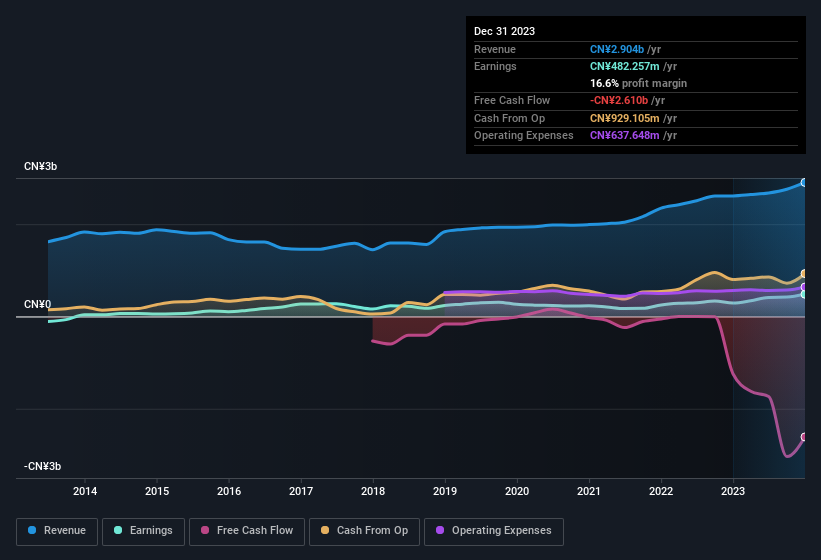Yunnan Energy Investment's (SZSE:002053) Earnings Are Weaker Than They Seem

Despite posting some strong earnings, the market for Yunnan Energy Investment Co., Ltd.'s (SZSE:002053) stock hasn't moved much. Our analysis suggests that this might be because shareholders have noticed some concerning underlying factors.
Check out our latest analysis for Yunnan Energy Investment

Examining Cashflow Against Yunnan Energy Investment's Earnings
As finance nerds would already know, the accrual ratio from cashflow is a key measure for assessing how well a company's free cash flow (FCF) matches its profit. The accrual ratio subtracts the FCF from the profit for a given period, and divides the result by the average operating assets of the company over that time. This ratio tells us how much of a company's profit is not backed by free cashflow.
That means a negative accrual ratio is a good thing, because it shows that the company is bringing in more free cash flow than its profit would suggest. That is not intended to imply we should worry about a positive accrual ratio, but it's worth noting where the accrual ratio is rather high. That's because some academic studies have suggested that high accruals ratios tend to lead to lower profit or less profit growth.
For the year to December 2023, Yunnan Energy Investment had an accrual ratio of 0.30. Unfortunately, that means its free cash flow was a lot less than its statutory profit, which makes us doubt the utility of profit as a guide. Over the last year it actually had negative free cash flow of CN¥2.6b, in contrast to the aforementioned profit of CN¥482.3m. We also note that Yunnan Energy Investment's free cash flow was actually negative last year as well, so we could understand if shareholders were bothered by its outflow of CN¥2.6b.
Note: we always recommend investors check balance sheet strength. Click here to be taken to our balance sheet analysis of Yunnan Energy Investment.
Our Take On Yunnan Energy Investment's Profit Performance
Yunnan Energy Investment didn't convert much of its profit to free cash flow in the last year, which some investors may consider rather suboptimal. Because of this, we think that it may be that Yunnan Energy Investment's statutory profits are better than its underlying earnings power. But on the bright side, its earnings per share have grown at an extremely impressive rate over the last three years. Of course, we've only just scratched the surface when it comes to analysing its earnings; one could also consider margins, forecast growth, and return on investment, among other factors. So while earnings quality is important, it's equally important to consider the risks facing Yunnan Energy Investment at this point in time. At Simply Wall St, we found 2 warning signs for Yunnan Energy Investment and we think they deserve your attention.
This note has only looked at a single factor that sheds light on the nature of Yunnan Energy Investment's profit. But there is always more to discover if you are capable of focussing your mind on minutiae. For example, many people consider a high return on equity as an indication of favorable business economics, while others like to 'follow the money' and search out stocks that insiders are buying. While it might take a little research on your behalf, you may find this free collection of companies boasting high return on equity, or this list of stocks that insiders are buying to be useful.
If you're looking to trade Yunnan Energy Investment, open an account with the lowest-cost platform trusted by professionals, Interactive Brokers.
With clients in over 200 countries and territories, and access to 160 markets, IBKR lets you trade stocks, options, futures, forex, bonds and funds from a single integrated account.
Enjoy no hidden fees, no account minimums, and FX conversion rates as low as 0.03%, far better than what most brokers offer.
Sponsored ContentNew: Manage All Your Stock Portfolios in One Place
We've created the ultimate portfolio companion for stock investors, and it's free.
• Connect an unlimited number of Portfolios and see your total in one currency
• Be alerted to new Warning Signs or Risks via email or mobile
• Track the Fair Value of your stocks
Have feedback on this article? Concerned about the content? Get in touch with us directly. Alternatively, email editorial-team (at) simplywallst.com.
This article by Simply Wall St is general in nature. We provide commentary based on historical data and analyst forecasts only using an unbiased methodology and our articles are not intended to be financial advice. It does not constitute a recommendation to buy or sell any stock, and does not take account of your objectives, or your financial situation. We aim to bring you long-term focused analysis driven by fundamental data. Note that our analysis may not factor in the latest price-sensitive company announcements or qualitative material. Simply Wall St has no position in any stocks mentioned.
About SZSE:002053
Yunnan Energy Investment
Manufactures and sells various salt products in China.
Reasonable growth potential average dividend payer.
Market Insights
Community Narratives




